In the wake of the recently passed Citizenship Amendment Act (CAA) several parts of the country have been rocked by violent protests including with the participation of some prominent institutions of learning. While violent protests are per se reprehensible, in the instant case an objective analysis of the nature of the Act and the prevailing circumstances would militate against even a peaceful agitation. Clearly, the protests being witnessed are the result of unfounded apprehensions fomented by vested interests who are acting against the national interest. A classic example of this is Mamata Bannerjee's call for a UN monitored referendum on the CAA !!! The fact that students have joined the protests does not inspire much confidence in our centres of higher learning. The least that one would have expected of such students was to be better informed about the realities of the CAA before mindlessly taking to the streets and resorting to vandalism.
Unfortunately, the Government narrative designed to set at rest these apprehensions has not succeeded. Much greater attention is required to address perception management both on internal and foreign policy related issues.
The CAA, in essence, contemplates the possibility of accord of Indian citizenship to the minority communities of the three Islamic states of Pakistan, Bangladesh, and Afghanistan who entered India up to 31st December 2014. These minorities comprise Hindus, Sikhs, Buddhists, Jains, Parsis and Christians who, living in these countries under constant threat of persecution simply because they are non-Muslims, have, even after the massive migration of 1947, been coming to India in driblets over the years.
The CAA, in so far as it applies to minorities from Pakistan and Bangladesh, is no more than a belated effort to rectify the mistake made by the Congress government in 1947 which, acting in the belief that the minorities would be safe in both West Pakistan and East Pakistan (currently Bangladesh), instead of facilitating their timely migration to India urged them to stay put in Pakistan. It did so even though it had been warned as early as June 1947 by Mr C.N. Chandra ICS, Relief Commissioner, and later Secretary, Ministry of Relief and Rehabilitation, that if the minorities were not evacuated out of Pakistan before 15th August 1947 we would witness a tragedy unprecedented in history. The tragedy took the form of an estimated million deaths and the migration to India in 1947 of as many as 7.5 million Hindus and Sikhs, around 5 million from West Pakistan and the rest from the then East Pakistan. While the bulk of the Hindus and Sikhs were driven out of West Pakistan by 1951 those from East Pakistan and later Bangladesh have been coming to India in smaller numbers over a much longer time span.
It needs to be noted at the outset that the CAA has not been suddenly sprung upon the nation as a bolt from the blue. The Citizen Amendment Bill on which the CAA is based has been in the public domain since 2016 and was duly cleared by a 30 member Parliamentary Select Committee. It is only after much debate, analysis, and due democratic process that it was enacted into a law on 12 December 2019.
The CAA is a narrow tailored law geared to facilitating the acquisition of Indian citizenship by the minorities of three of our Islamic neighbours mentioned above who entered India before the end of 2014. It neither affects the citizens of India, including Muslims, nor does it in any way close the existing channels of registration or naturalisation of migrants from any country, including our three Islamic neighbours, as Indian nationals. Indeed, in the last six years 2830 Pakistanis, 912 Afghans, and 172 Bangladeshis, many of whom were Muslims, have been accorded Indian citizenship. Additionally, 14864 Bangladeshis were accorded Indian nationality consequent on the exchange of enclaves between the two countries in 2014. The Act cannot, therefore, by any stretch of imagination be regarded as anti-Muslim as so vigorously being projected by those opposed to it.
The Opposition further contends that the Act is unconstitutional most notably on the grounds that it violates Article 14 which provides for equality under the law, Article 15 which prohibits discrimination including on grounds of religion, and that it goes against the grain of the basic structure of the constitution which inter alia provides for secularism. Mr Harish Salve, one of our foremost legal minds and former solicitor general of India, in a series of interviews to a number of Indian TV channels has effectively countered all these contentions.
In respect of Article 14, for instance, the courts have upheld legislation containing apparently discriminatory provisions where discrimination is based on a reasonable basis. By "reasonable" it is meant that the classification must be rational and not arbitrary. The judicially enunciated test for this requires fulfilment of the following two conditions:-
- The classification must be founded on an intelligible differential which distinguishes those that are grouped together from others.
- The differential must have a rational relation to the objective sought to be achieved.1
Mr Salve argues that the Act meets this test as it creates a reasonable classification on the basis of an intelligible differential which has a nexus with its objectives. Similarly, Dr Subramanian Swamy in an article entitled "A Premature Denouncement of the Citizenship Act" in the Hindu of 21 December 2019 points out that the Supreme Court has repeatedly made it clear that "equality before law is only for those equally placed" and that on the issue of "religious persecution, the Muslims of Pakistan etc., are not similarly placed as the minorities in those countries".
As to Article 15 Mr Salve points out that the same is only applicable to citizens of India as distinct from those resident here. Finally, as to the Act going against the basic structure of the constitution, and most particularly the principle of secularism, he makes the point that these concepts are nebulous and there are no precise formulations thereon in the constitution. Thus, prima facie, claims as to the unconstitutionality of the CAA appear to be ill founded.
However, even if one assumes that there is some merit in the Opposition's claims that the CAA is unconstitutional the violent agitations against it are totally uncalled for as it is slated to be tested in the courts in the coming days. In this context, to take to the streets against the bill is unwarranted and only an effort at political point scoring. It is to be hoped that the Government will take stern action against those who have instigated the agitation as well as those who have vandalised public property. Indeed, they should be required to compensate the State for the damage caused. While all, including students, have the right to peaceful protest equally when such protests turn violent leading to damage of public property and attacks on the police they must naturally be put down with a heavy hand. Specifically, as regards the agitating students as the Chief Justice of India remarked just because they are students "it doesn't mean that they can take law and order in their hands." Indeed, as stated by Mr Vivek Gumaste in an article in the Sunday Guardian of 22 December 2019 "Rather than orchestrating street side brawls, universities as centres of learning would be better off conducting scholarly debates on the CAA."
Apart from the objections about the constitutionality of the CAA, the Opposition has also argued that as a result of it those resident in India who do not figure in the proposed countrywide National Register of Citizens (NRC) will be treated differentially. While residents from the minority communities of Bangladesh, Pakistan, and Afghanistan, who have entered India before the end of 2014 will enjoy easier access to Indian citizenship and thus are likely to be included in the NRC, the Muslims, who have come from these countries, would be deprived of this possibility and would not find place in the NRC. Drawing upon the experience of the highly flawed citizenship registration exercise recently undertaken in Assam it has further contended that the full weight of the onerous requirements imposed for those seeking inclusion in the NRC would fall on the Muslim community in India and thus the CAA introduces a religious test to citizenship.
There is no denying the fact that as a result of the CAA, minorities from our three Islamic neighbours who entered India prior to the end of 2014 will receive preferential treatment for incorporation in the countrywide NRC as compared to the Muslims who came from these countries. However, since these Muslims are not Indian citizens and are merely illegal migrants to India it should be of no concern to any Indian, Muslim or otherwise. The concern that the genuine Muslim citizens of India would have to face the full weight of the onerous requirements entailed in a countrywide NRC is more justified but only if the process for compiling the Register is patterned on the highly flawed one used in Assam. In this context, it may be noted that the exercise to initiate the countrywide NRC is yet to take off and the requisite rules and regulations for the same are still to be framed. Furthermore, it would not be unreasonable to assume that the authorities would have learnt from the mistakes made in Assam and would come up with a much simpler, practical, and more effective process for developing the proposed NRC which would not only be virtually error free and but would also not impose any hardship on those who are genuine citizens of the country. While the Government, on its part, needs to develop this process with transparency and in consultation with diverse stakeholders, including the Opposition, the latter, on its part, rather than casting aspersions on the proposed exercise should come up with concrete and constructive suggestions so that the creation of the proposed NRC can be undertaken effectively and painlessly. This is an issue of national interest and it behoves all stake holders to join hands to make it a success.
It needs to be noted that India is in dire need of a NRC as a means to curb illegal migration and its creation has been mooted from time to time. For instance, the Group of Ministers (GOM) set up following the Kargil conflict to look into national security in its entirety had recommended the compulsory registration of all citizens and non-citizens living in India with the former being given Multipurpose National Identity Cards and the latter cards of a different colour and design. It had additionally recommended the introduction of a work permit for foreigners. The recommendations were accepted by the Government in 2001 and subsequently the Citizenship Act 1955 was amended in 2004 by inserting Section 14A, which allowed the central government to compulsorily register every citizen of India and issue them a national identity card. Unfortunately, the GOM recommendation to issue work permits to foreigners was not implemented. It is hoped that this recommendation is revisited as it is well-nigh impossible to deport the millions who are likely to be declared illegal migrants and who are mainly from Bangladesh. Above all, it will not only put at rest the apprehensions of deportation or being herded into camps amongst those not included in the NRC but will also alleviate the fears of Bangladesh that we would pressurise it to take back those who have migrated from there.
While the bulk of the agitations in the country against the CAA have been animated by issues of its constitutionality and the religious factor, those in the North East have been animated by the fear that it will allow a sizeable chunk of the illegal migrants in the region to acquire Indian citizenship. For instance, as per unofficial guesstimates, out of the 19 lakh illegal migrants detected during the Assam NRC process around 11 lakhs were Hindus who would be entitled to Indian citizenship as per the CAA. Many in the North East are unhappy that these illegal Hindu migrants rather than being deported as they had been led to believe can become Indian citizens and thus continue to stay on in Assam. They also fear that the CAA would encourage further waves of migration to the region. While one can sympathise with some of these sentiments the fact is that the Assam NRC stands rejected and it is only the country wide NRC which will determine as to who is a citizen of India and who an illegal migrant. Besides migrants residing in those part of the North East covered by the Sixth Schedule of the Constitution and by the Inner line Permit system will not be eligible for Indian nationality. As to the CAA encouraging further Hindu migration this is incorrect as it is explicitly applicable only to those who came to India up till the end of 2014. Thus the protests in the North East are not really justified and are motivated more by emotion than reason. Moreover, deportation of illegal migrants is not a practical proposition. The only viable option is to undertake an effective identification of citizens and illegal migrants with the latter being allowed to stay in the country on the basis of work permits for a finite period of say five years.
In order to build on the gains of the CAA and the NRC India would be well advised to evolve a refugee policy. This is all the more necessary as a means to keep our doors open to migration of minorities from Afghanistan, Bangladesh, and Pakistan in the period post 2014. Indeed, one can argue that much of the flak India has taken, as a result of the CAA and the proposed countrywide NRC, both abroad and at home, could have been avoided had we had in place a well-crafted refugee policy. We would certainly have avoided annoying Bangladesh and Afghanistan whom we have repeatedly charged with persecuting minorities. Though we have clarified that such persecution was undertaken by previous regimes no country likes to be labelled as repressive.
Given our ethos, traditions, and practices it is surprising that we have not yet evolved a refugee policy. This is all the more so as India is surrounded by fragile democracies from where an efflux of people due to persecution is always a possibility.
There is strong case for developing a national refugee law as in its absence the treatment meted out to each refugee differs and is determined in an ad hoc manner. India should, in fact, also become a signatory to the 1951 UN Convention on the Status of Refugees and its related 1967 Protocol which have been signed by over 140 countries, since it is host to a very large migrant population and observes the highest standard of treatment of refugees including the principle of non-refoulement. India, incidentally, has been a member of the Executive Committee of the High Commission of Refugees since the mid 90's.
Some of the advantages accruing from a national refugee policy may be listed as follows:
- It will facilitate equality in the treatment of various categories of refugees by defining their rights;
- It will institutionalise the process for identifying foreigners in India notably genuine refugees and illegal migrants. Checks against illegal migrants would thus be streamlined and strengthened.
- It would provide a legal status for refugees which could be temporary and may be predicated not only on rights but also duties.
- It could include provisions for safeguarding India's security and other concerns such as the quantum of intake of migrants and their location.
- It would enable involvement of the UNHCR which would not only provide financial support but also help relocate the refugees to the country of origin.
- Finally, it would insulate India from any aspersions as to its motives in providing shelter to the persecuted from areas such as Baluchistan or Sinkiang.
A draft refugee law was, one understands, considered in 2010 but was turned down on rather flimsy considerations such as that it would encourage a fresh influx of economic migrants from Bangladesh, absence of national identity papers, inadequate border controls etc. A fresh influx of economic migrants from Bangladesh is unlikely as economic conditions there are now much better, the situation of Indian identity documentation has also improved and border controls though still not what they should be can be quickly optimised given the demarcation of our borders with Bangladesh.
In these circumstances, a comprehensive refugee law needs to be developed which while enabling the controlled migration of the persecuted to India would not jeopardise national security and would enable the migrants to live in India with safety and dignity till their return home.
References
- "The Constitution of India" with Comments by P.M. Bakshi former Director India Law Institute and Former Member Law Commission of India.
(The paper is the author’s individual scholastic articulation. The author certifies that the article/paper is original in content, unpublished and it has not been submitted for publication/web upload elsewhere, and that the facts and figures quoted are duly referenced, as needed, and are believed to be correct). (The paper does not necessarily represent the organisational stance... More >>
Image Source : https://www.jagranimages.com/images/newimg/21122019/21_12_2019-caasupport21_19864900.jpg

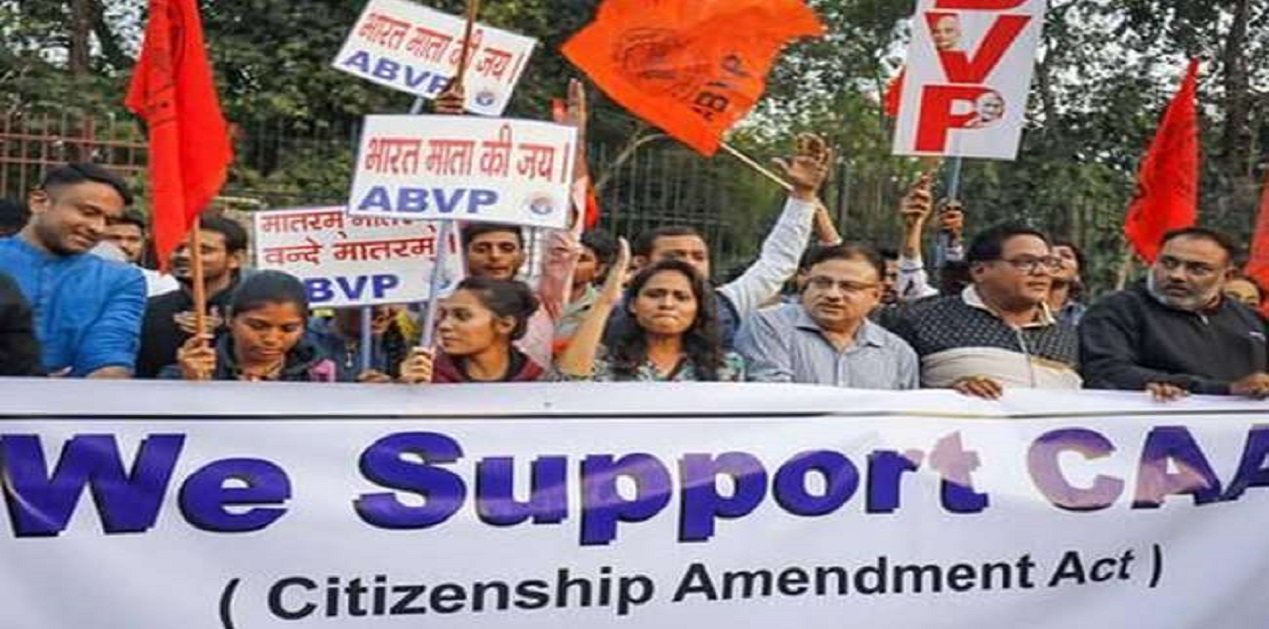
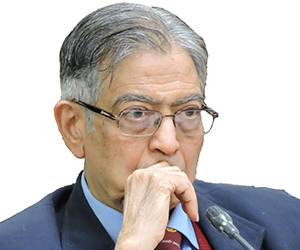
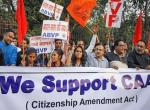




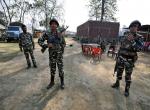
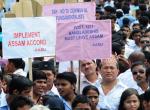

Post new comment